Master IELTS Note Completion: 6 Essential Steps for High Scores
Note Completion questions dominate IELTS Listening tests, appearing consistently in Parts 2 and 4 across academic formats. This comprehensive guide reveals six proven strategies that transform challenging gap-filling exercises into reliable point-scoring opportunities. Master these expert techniques to navigate academic lectures confidently and achieve your target band score through systematic preparation and strategic application.
- I. What is the Note Completion in IELTS Listening?
- II. Format of Note Completion in IELTS Listening
- III. Common mistakes when doing the Note Completion in IELTS Listening
- IV. Steps to conquer the Note Completion in IELTS Listening
- V. Useful tips for handling the Note Completion in IELTS Listening
- VI. Exercises on Note Completion in IELTS Listening with detailed answers
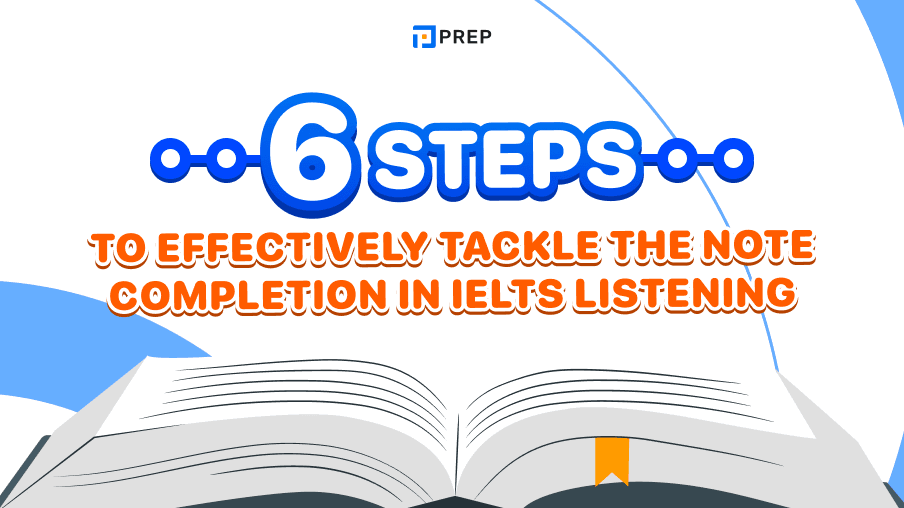
I. What is the Note Completion in IELTS Listening?
Note Completion in IELTS Listening represents a question format requiring candidates to fill gaps within a provided summary or outline. This question type appears consistently across IELTS Listening tests, establishing itself as one of the most frequent formats test-takers encounter.
Note Completion questions predominantly surface in Part 2 and Part 4 of the listening examination. These sections typically feature academic lectures or detailed presentations where candidates must extract specific information to complete missing details.
Example of Note Completion Format:
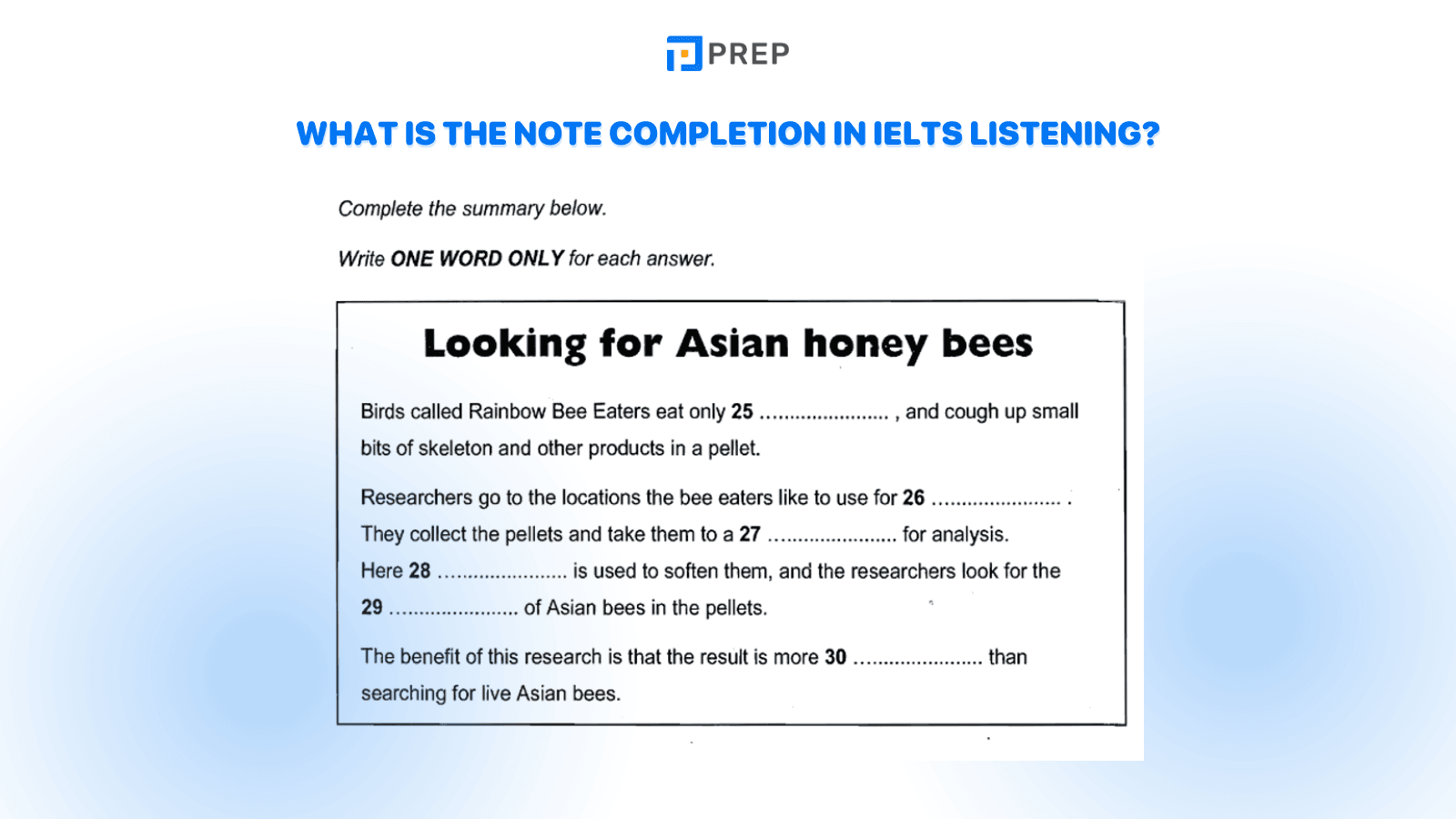
II. Format of Note Completion in IELTS Listening
Several distinct characteristics help identify Note Completion questions within the IELTS Listening test:
-
Note Completion questions often appear at the end of the listening section with 10 questions. Usually, candidates will listen to a lecture by a professor on an academic topic. Similar to being in a lecture hall, students are required to take notes during the lecture. This question type tests the ability to recognize specific information to fill in the gaps. The questions will indicate how many words or letters are needed for each blank.
-
Spelling is crucial, so try not to lose points due to spelling mistakes.
-
You will only hear the recording once, so it's important to stay focused while listening.
-
Most importantly, for a lecture by a professor on an academic topic, if you don't have the necessary vocabulary, you won't be able to understand even with all the tips and tricks. Therefore, continuously expose yourself to various topics to improve your language skills.
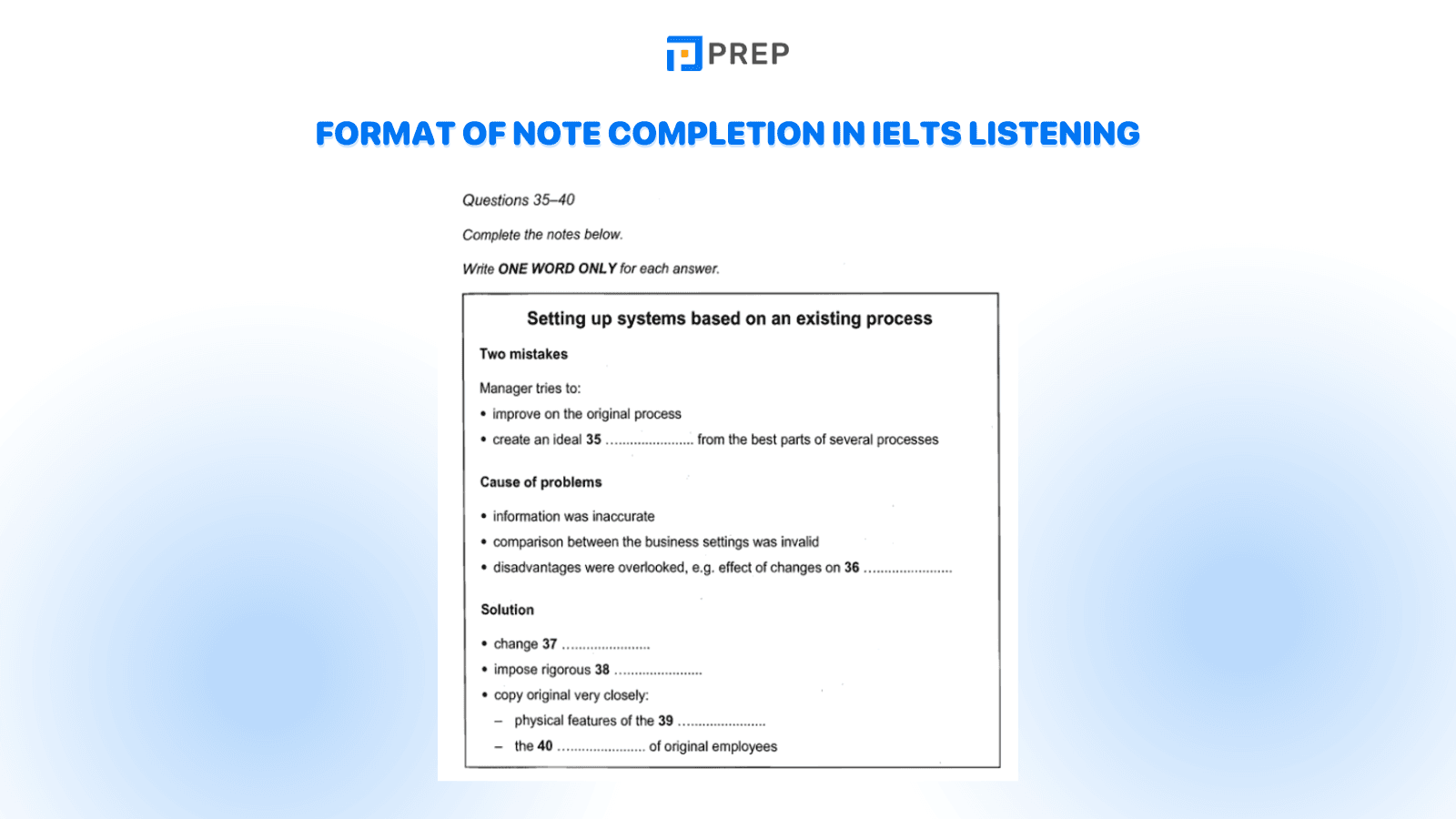
III. Common mistakes when doing the Note Completion in IELTS Listening
Numerous candidates lose valuable points during IELTS Listening tests, particularly within Completion formats. Understanding these frequent mistakes helps prevent similar errors and improves overall performance.
-
Carelessness and lack of attentiveness: Many mistakes occur due to lack of attention, resulting in spelling errors. Just one wrong word can make the entire word incorrect, for example, "lighting" and "lightning" are different by just one letter.
-
Superficial checking of answers: It's important to check the answers against your predictions to correct any grammar mistakes.
-
Lack of vocabulary: Some words may need to be guessed, such as "bush honey," which can be inferred based on pronunciation. It cannot be written as "push honey."
-
Trapped by misleading information: This is one of the most fundamental mistakes. Therefore, read the question carefully and listen attentively to the audio to avoid falling into traps of misleading information.
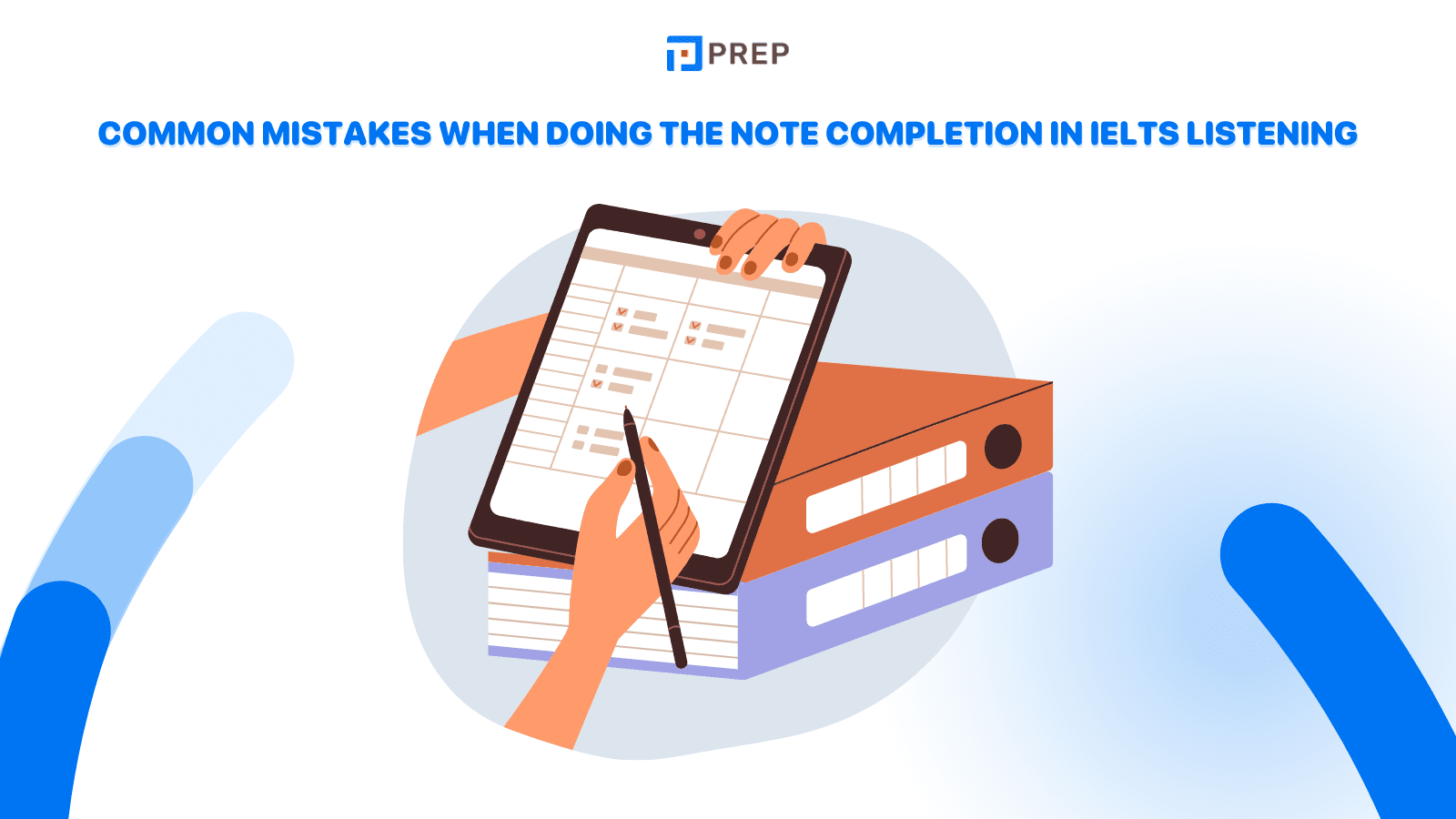
IV. Steps to conquer the Note Completion in IELTS Listening
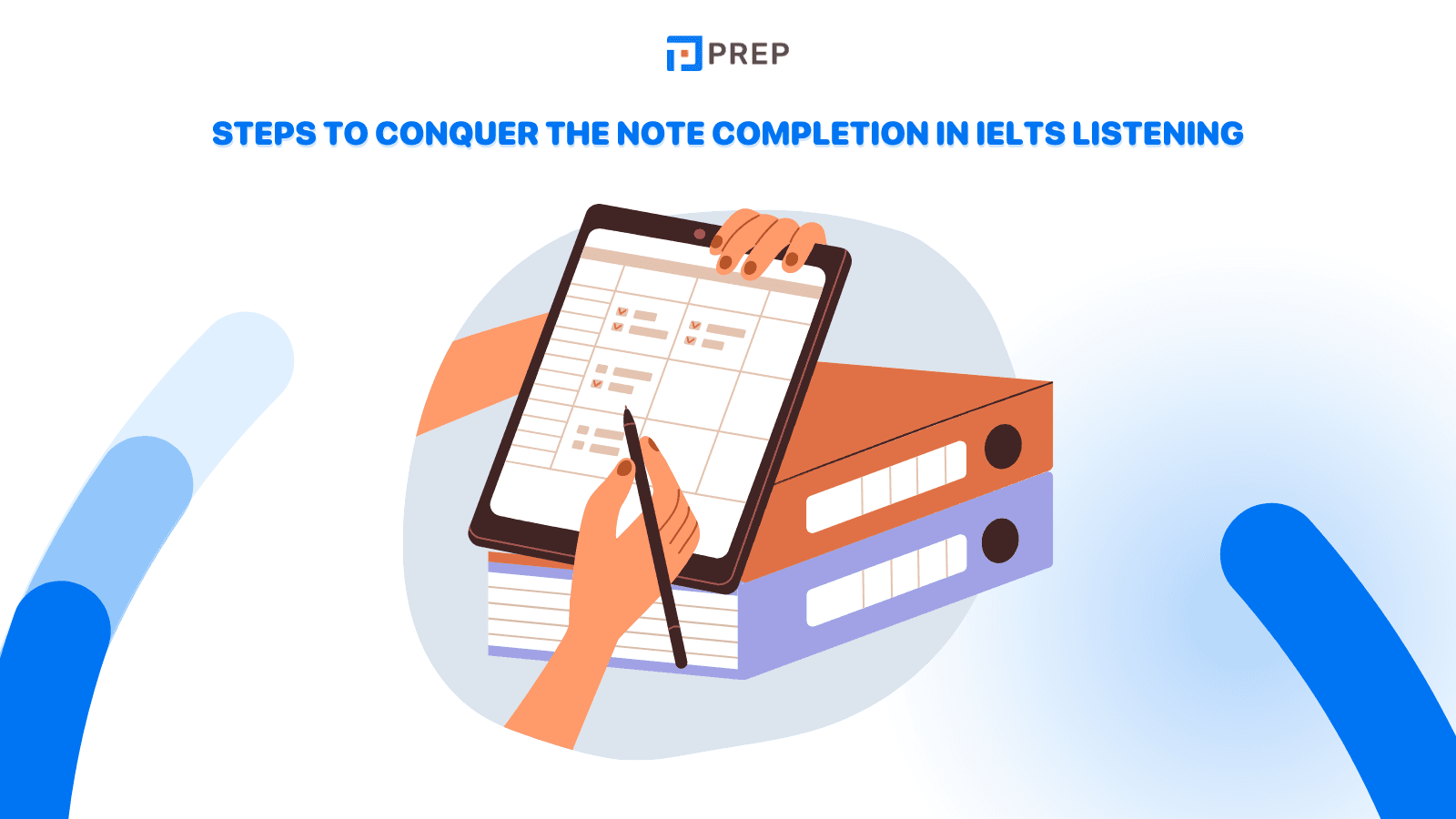
Achieving high scores in Note Completion requires systematic approaches and consistent application. Master these six steps and implement them during actual IELTS Listening examinations to reach your target band score.
-
Step 1: Read the task requirements: Read the requirements in the task to know the word and number limits for the answers.
-
Step 2: Read the heading: Read the heading to understand the topic of the note. This step helps to recall vocabulary related to the topic.
-
Step 3: Read the question + underline keywords: Underline keywords to pay attention to where the recording is discussing and to be more alert to the information.
-
Step 4: Predict: Predict the information to be filled in + predict traps/be cautious about certain information. Usually, you will hear paraphrases of keywords, and this step requires continuous practice to be able to recognize paraphrases. Traps often involve singular/plural nouns and traps when hearing numbers ending in -teen and -ty. It's normal to make mistakes if you don't anticipate the traps.
-
Step 5: Listen + fill in the answers: Listen to the audio and fill in the answers on the answer sheet.
-
Step 6: Check the answers: Candidates often skip this step, which is regrettable as it can lead to avoidable errors. Sometimes, just spending 30 seconds to review can increase the number of correct answers. Remember to compare your predictions with the answers to see if they match.
V. Useful tips for handling the Note Completion in IELTS Listening
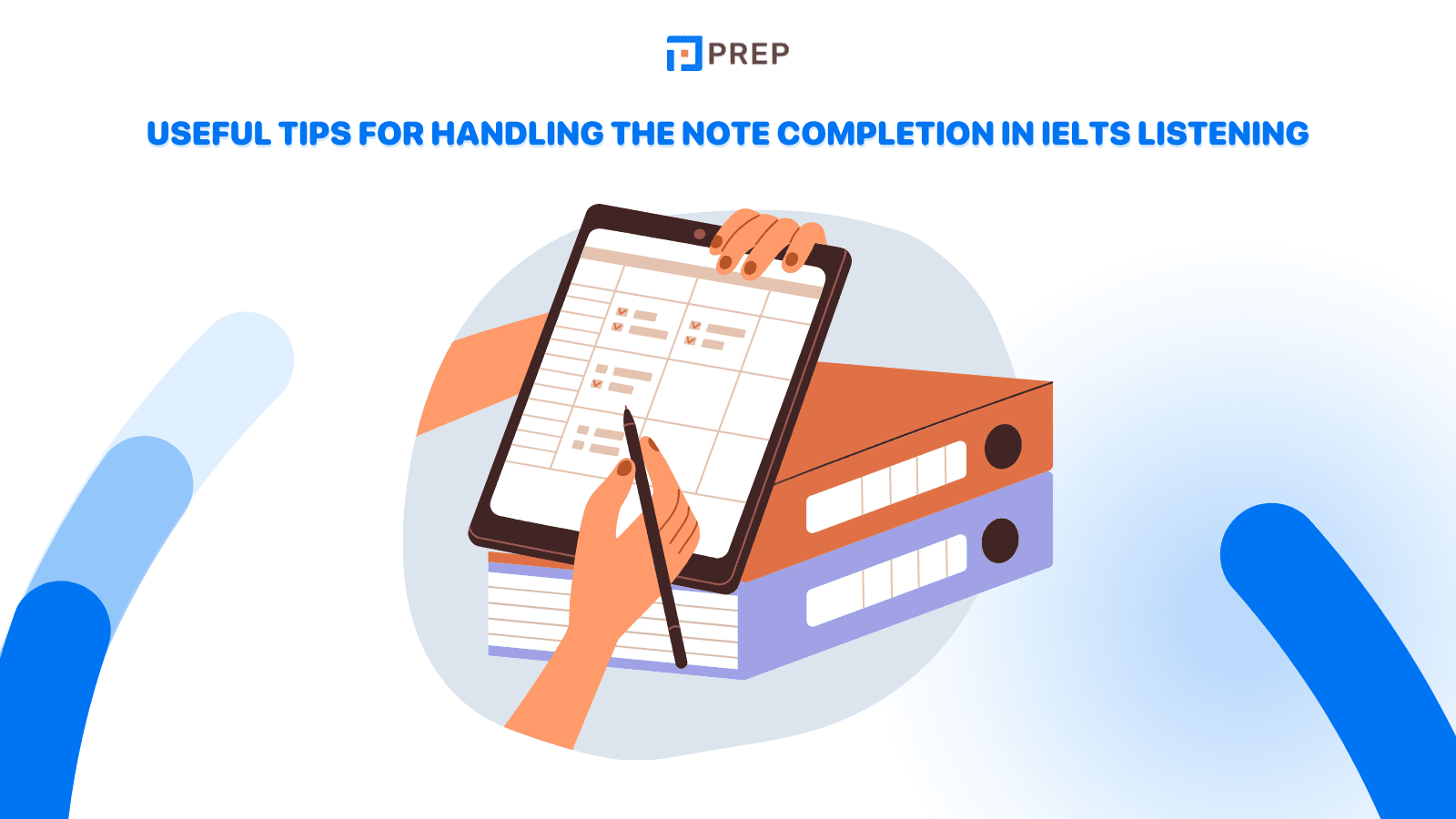
Vocabulary expansion forms the foundation of improved listening performance. Systematic exposure to academic terminology across multiple disciplines enhances comprehension capabilities and reduces dependence on guessing strategies.
Prediction skills require continuous development through regular practice. Active listening involves anticipating information rather than passively receiving audio input. This proactive approach maintains concentration and enables more accurate decision-making.
Sustained concentration becomes crucial during extended listening segments. Minimize environmental distractions and develop mental stamina through progressive practice sessions. Some answers require inference based on contextual clues, pronunciation patterns, and grammatical structures when encountering unfamiliar vocabulary.
VI. Exercises on Note Completion in IELTS Listening with detailed answers
1. Note Completion Listening practice - Exercise 1
Listening file: Here
Answer keys:
-
1. central
-
2. 600
-
3. two years
2. Note Completion Listening practice - Exercise 2
Listening file: Here
Answer keys:
-
MILPERRA
-
first class movers
-
28 November
-
screen
-
bathroom
-
door
-
140
-
leg
-
plates
-
60
The six-step approach for handling Note Completion in IELTS Listening provides a structured framework for consistent success. While individual candidates may adapt these steps based on personal learning preferences, the fundamental principles remain effective across different proficiency levels.
Regular practice using authentic materials combined with systematic vocabulary development creates the optimal preparation strategy. Experiment with these techniques during independent study sessions to identify the most suitable approaches for your learning style and target band score achievement.

Hi I'm Chloe, and I am currently serving as an Product Content Administrator at Prep Education. With over five years of experience in independent online IELTS study and exam preparation, I am confident in my ability to support learners in achieving their highest possible scores.
Comment
Premium content
View allPersonalized roadmap
Most read












